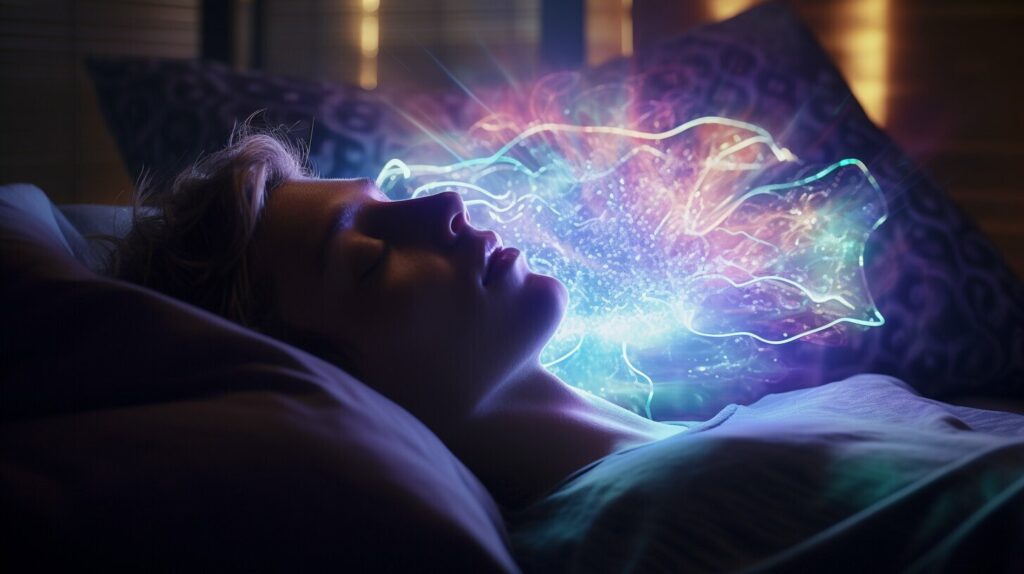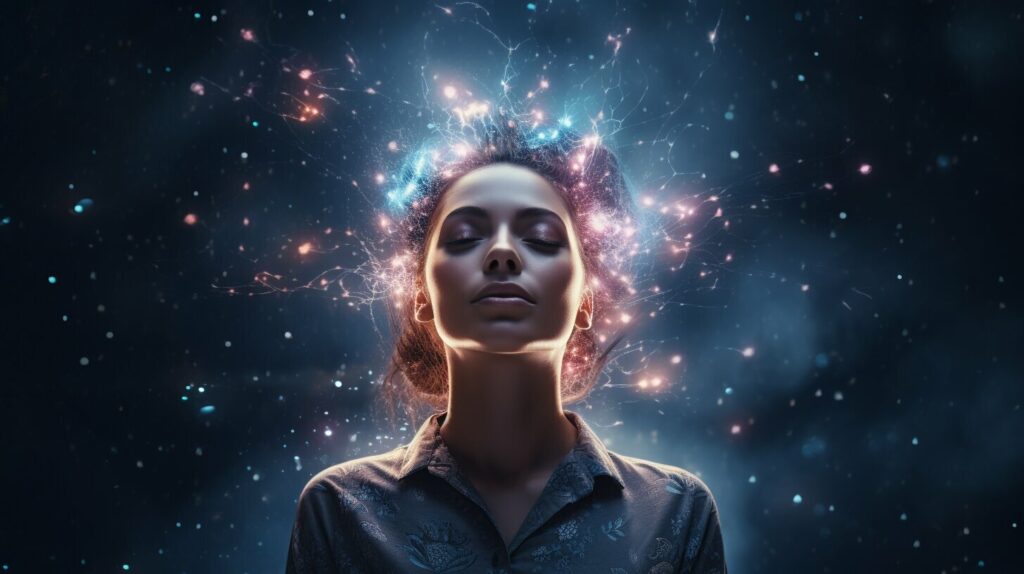Have you ever had a dream that felt so real you were convinced it was actually happening? What if you could take control of your dreams and direct them to unfold in any way you desired? This is the tantalizing prospect of lucid dreaming, a phenomenon that has fascinated people for centuries.
But can magnesium, a mineral that plays a vital role in many bodily functions, really affect our dream experiences? This is a question that has piqued the interest of many lucid dreaming enthusiasts and researchers alike. In this article, I will delve into the potential connection between magnesium and lucid dreaming, exploring existing research and offering practical tips for those interested in enhancing their dream experiences.
Key Takeaways:
- Lucid dreaming allows people to take control of their dreams and direct them in any desired way.
- Magnesium is a mineral that is essential for many bodily functions.
- The connection between magnesium and lucid dreaming is a topic of interest for enthusiasts and researchers.
The Science Behind Lucid Dreams
Before we dive into the potential connection between magnesium and lucid dreaming, it’s important to understand what lucid dreaming actually is and how it differs from regular dreaming.
Lucid dreaming is a state in which the dreamer is aware that they are dreaming and can often manipulate the dream environment or storyline. This can lead to incredibly vivid and immersive dream experiences, and some individuals even use lucid dreaming for creative or therapeutic purposes.
One of the key factors in achieving lucid dreaming is dream recall. This refers to the ability to remember one’s dreams in detail, which is often a learned skill that can be improved with practice. Additionally, sleep quality plays a crucial role in the likelihood of experiencing lucidity in dreams.

Research suggests that lucid dreaming primarily occurs during the Rapid Eye Movement (REM) stage of sleep, which is characterized by increased brain activity and vivid dreaming. While the exact mechanisms that lead to lucid dreaming are not yet fully understood, it is believed to involve the prefrontal cortex, the part of the brain responsible for self-awareness and decision making.
Understanding Magnesium and its Functions in the Body
Before diving into the potential connection between magnesium and dreaming, let’s first explore the importance of this essential mineral in the body.
Magnesium is involved in over 300 biochemical reactions in the body, ranging from energy production to nerve function to protein synthesis. It also plays a crucial role in regulating sleep and promoting relaxation.
In terms of sleep, magnesium helps to activate the parasympathetic nervous system, which is responsible for the “rest and digest” response. This can lead to deeper and more restful sleep, as well as improved sleep quality overall.
Additionally, research has suggested that magnesium may be involved in the regulation of dream recall. A study published in the Journal of Sleep Research found that individuals who had higher levels of magnesium in their blood had better dream recall than those with lower levels.

These findings suggest that magnesium may have a role to play in the dreaming process, and could potentially enhance the likelihood of experiencing lucidity during dreams.
The Potential Link Between Magnesium and Dreaming
As we have seen in the previous sections, magnesium plays a vital role in various bodily functions, including sleep regulation and brain health. It is not surprising, then, that some studies have explored the potential link between magnesium intake and dreaming.
One study published in the Journal of Sleep Research investigated the effects of magnesium supplementation on elderly participants with insomnia. The study found that magnesium supplementation improved sleep efficiency and increased the concentration of renin, a hormone involved in regulating blood pressure and fluid balance. Additionally, the participants reported an increase in dream vividness and recall.
| Study | Participants | Intervention | Results |
|---|---|---|---|
| Journal of Sleep Research | Elderly participants with insomnia | Magnesium supplementation | Improved sleep efficiency, increased renin concentration, and increased dream vividness and recall |
While this study provides some evidence for the potential benefits of magnesium supplementation on dream experiences, it is worth noting that the sample size was relatively small and the results may not be generalizable to other populations. Additionally, the study did not specifically investigate lucid dreaming, so it is unclear whether magnesium supplementation can enhance lucidity specifically.
Another study published in the journal Dreaming explored the effects of magnesium supplementation on dream content and lucidity. The study recruited 47 participants who reported a history of lucid dreaming and randomly assigned them to either a magnesium or placebo group. The participants took their respective supplements for a week and recorded their dream experiences in a diary.
The results of the study indicated that the magnesium group reported more dream content related to emotions, colors, and vividness compared to the placebo group. However, there were no significant differences in the frequency of lucid dreams between the two groups.
| Study | Participants | Intervention | Results |
|---|---|---|---|
| Dreaming | 47 participants with a history of lucid dreaming | Magnesium or placebo supplementation for a week | Magnesium group reported more dream content related to emotions, colors, and vividness compared to placebo group; no significant differences in the frequency of lucid dreams |
These studies suggest that magnesium may have some influence on dream experiences, but more research is needed to determine the precise mechanisms and whether it can specifically enhance lucid dreaming.

Studies on Magnesium and Dreaming
Several studies have explored the potential effects of magnesium supplementation on dreaming experiences. One study published in the journal Sleep and Hypnosis investigated the effects of magnesium on dream content and found that participants who took a magnesium supplement had higher dream vividness and better dream recall compared to those who did not take the supplement.
Another study published in the journal Frontiers in Psychology examined the effects of magnesium supplementation on sleep quality and reported a significant improvement in overall sleep quality, as well as an increase in dream frequency and lucidity.
| Study | Findings |
|---|---|
| Sleep and Hypnosis | Higher dream vividness and better dream recall with magnesium supplementation. |
| Frontiers in Psychology | Improved overall sleep quality, increased dream frequency and lucidity with magnesium supplementation. |
While these studies provide some promising evidence for the potential benefits of magnesium for dreaming and lucid dreaming, it is important to note that more research is needed to establish a conclusive link between magnesium intake and dream experiences.

“The findings from these studies suggest that magnesium supplementation may have a positive impact on dream experiences, but we need more research to fully understand the connection.”
Factors Influencing Dreaming and Lucidity
While magnesium may have a role in promoting lucid dreams, it’s important to understand that dream experiences are influenced by a multitude of factors.
One significant factor is overall sleep quality. Poor sleep habits, such as irregular sleep schedules or insufficient sleep durations, can negatively impact dream recall and the ability to achieve lucidity. Therefore, prioritizing a consistent and adequate sleep routine can improve the likelihood of having vivid and memorable dreams.
Another factor is stress levels. High levels of stress and anxiety can interfere with dream quality and reduce the likelihood of lucid dreams. Implementing stress-reducing practices, such as mindfulness or meditation, can improve dream experiences.
Additionally, lifestyle habits like alcohol consumption or drug use can also affect dreaming experiences. These substances can disrupt sleep patterns and interfere with dream recall and lucidity.
In short, while magnesium may have potential benefits for lucid dreaming, it’s critical to address and manage other factors that can impact dream experiences. By adopting healthy sleep habits, reducing stress levels, and avoiding disruptive substances, individuals can increase their chances of having fulfilling and memorable dreams.

Potential Side Effects and Precautions of Magnesium Supplementation
While magnesium is generally considered safe when taken within recommended dosages, there are some potential side effects and precautions to keep in mind. It’s always important to consult with a healthcare professional before starting any supplementation regimen, especially if you have any preexisting medical conditions or are taking medications.
Some possible side effects of magnesium supplementation include:
| Side Effect | Description |
|---|---|
| Stomach upset | Magnesium supplements can cause gastrointestinal discomfort, including diarrhea and nausea. |
| Lowered blood pressure | Magnesium can lower blood pressure, which may be a concern for those who already have low blood pressure or are taking medications that lower blood pressure. |
| Interference with certain medications | Magnesium can interact with some medications, including antibiotics and diuretics, potentially reducing their effectiveness. |
It’s also important to note that magnesium supplements may not be necessary for everyone, as many foods contain magnesium naturally. However, if you are interested in incorporating magnesium into your lucid dreaming practices, talk with your healthcare professional to determine the appropriate dosage and any potential risks.

It’s worth noting that magnesium supplementation may also have benefits beyond lucid dreaming, including improved sleep quality, reduced stress levels, and muscle relaxation. However, as with any supplement, it’s important to approach it with caution and under the guidance of a healthcare professional.
Tips and Techniques for Lucid Dreaming
Lucid dreaming can be an exciting and rewarding experience. Here are some tips and techniques that have worked for me:
- Perform reality checks throughout the day to increase self-awareness. This can include looking at your hands, trying to push your finger through your palm, or checking the time multiple times.
- Keep a dream journal to increase dream recall and awareness. Write down any details or emotions from your dreams as soon as you wake up.
- Practice visualization and intention-setting before bed. Imagine yourself becoming aware in your dreams and setting an intention for what you want to accomplish.
- Experiment with different induction techniques, such as WILD (Wake Induced Lucid Dreaming) or MILD (Mnemonic Induced Lucid Dreaming).
- Try supplements that have been shown to enhance dreaming, such as vitamin B6 or melatonin.
- Finally, consider integrating magnesium into your lucid dreaming practices. This mineral has been linked to improved sleep quality and dream recall. Try taking a magnesium supplement before bed, and see if it enhances your dream experiences.
Remember, lucid dreaming takes practice and patience. Keep a positive attitude and stay committed to your lucid dreaming practices. Who knows, with time and effort, you might just have the experience of a lifetime.

Integrating Magnesium into Lucid Dreaming Practices
Now that we have explored the potential benefits of magnesium for lucid dreaming, you may be wondering how to incorporate magnesium into your existing practices. Here are some guidelines:
- Consult with a healthcare professional: Before starting any supplementation regimen, it is important to consult with a healthcare professional. They can provide personalized recommendations based on your health history and current medications, and help you determine the appropriate dosage of magnesium.
- Choose the right form of magnesium: There are several forms of magnesium available as supplements, and each has its own benefits and drawbacks. For example, magnesium citrate is highly absorbable but may cause digestive side effects, while magnesium oxide is less absorbable but may be better tolerated by some individuals. Research the different forms and choose the one that suits your needs.
- Take magnesium before bed: Since magnesium has been shown to improve sleep quality, taking it before bed may help you fall asleep faster and have more restful sleep. This can increase your chances of having lucid dreams.
- Combine magnesium with other lucid dreaming techniques: While magnesium may enhance dream experiences on its own, it can be even more effective when combined with other techniques such as reality checks, dream journaling, and induction techniques. Experiment with different combinations to find what works best for you.
Remember, integrating magnesium into your lucid dreaming practices should not replace established medical treatments or interventions. Always prioritize your health and safety, and consult with a healthcare professional before starting any new supplement or practice.

Conclusion
In conclusion, the relationship between magnesium and lucid dreaming is a topic of interest that has yet to be fully explored. While there is some anecdotal evidence and a few studies that suggest a link between magnesium and dream experiences, more research is needed to establish a clear connection.
That said, magnesium is an essential mineral that plays a vital role in many bodily functions, including brain health, sleep regulation, and dream recall. Supplementing with magnesium may have potential benefits for those interested in exploring lucid dreaming, but it is important to consult with a healthcare professional and understand potential side effects and precautions.
Furthermore, achieving lucid dreams is a complex process that involves various factors such as sleep quality, stress levels, and lifestyle habits. By incorporating techniques such as reality checks, dream journaling, and induction techniques into their practices, individuals can increase their chances of having lucid dreams.
Overall, while the potential benefits of magnesium for lucid dreaming are intriguing, it is important to approach the topic with an open mind and to prioritize overall health and wellness. With further research and experimentation, we may uncover more about the fascinating relationship between magnesium and dreaming experiences.
FAQ
Q: Does magnesium cause lucid dreams?
A: While there is limited scientific research on the direct connection between magnesium and lucid dreaming, anecdotal evidence suggests that magnesium supplementation may potentially enhance dream experiences, including lucid dreaming.
Q: What are the effects of magnesium on dreaming?
A: The effects of magnesium on dreaming are not fully understood. However, some individuals report increased dream vividness, recall, and even the ability to become lucid in their dreams after taking magnesium supplements.
Q: Can magnesium supplements improve dream recall?
A: Magnesium is involved in various bodily functions, including sleep regulation and brain health. Some individuals believe that magnesium supplementation may improve dream recall, although scientific evidence supporting this claim is limited.
Q: How does magnesium affect dreams?
A: The mechanisms through which magnesium might influence dreams are not fully understood. It is believed that magnesium’s role in brain health and sleep regulation may indirectly impact dream experiences, including aspects like dream vividness and recall.
Q: Are there any side effects or precautions to consider when using magnesium supplements for dreaming?
A: While magnesium is generally considered safe for most individuals, it is essential to consult with a healthcare professional before starting any supplementation regimen. Magnesium supplements can potentially cause side effects such as digestive issues or interactions with certain medications.
Q: What are some tips and techniques for lucid dreaming?
A: Enhancing dream recall and increasing the chances of having lucid dreams can involve various techniques. Some popular methods include reality checks, dream journaling, and practicing induction techniques like mnemonic induction of lucid dreams (MILD) or wake-induced lucid dreaming (WILD).
Q: How can I integrate magnesium into my lucid dreaming practices?
A: If you are interested in incorporating magnesium into your lucid dreaming practices, it is recommended to follow dosage guidelines and consult with a healthcare professional. Magnesium can be taken as a supplement, and its timing and potential interactions with other lucid dreaming techniques should be considered.






